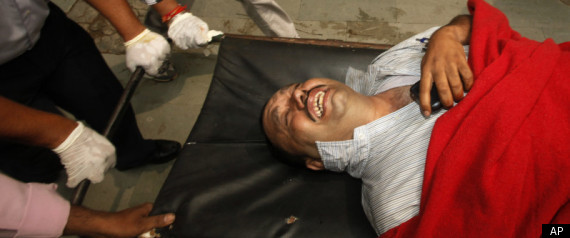NEW DELHI: Nine people were killed and at least 45 others injured in a powerful blast outside Delhi high court gate number 5 on Wednesday morning.
Home ministry official UK Bansal told reporters that the explosives appeared to have been kept in a briefcase. The blast took place at around 10.15 am.
The injured have been taken to AIIMS, RML and Safdarjung hospitals. The Delhi Police have cordoned off the area, not far from Parliament and the Prime Minister's Office. Fire tenders have been rushed to the spot.
Top officials of Delhi Police including Special Commissioner (law and order) Dharmendra Kumar and Joint Commissioner of Special Cell RS Krishnaiah have rushed to the spot.
Jt Commissioner (Crime) Sandip Goyal and Special Commissioner PN Aggarwal also joined them.
Rajya Sabha has been adjourned till 2pm to allow government collect information and make its statement on bomb blast outside Delhi High Court.
The blast was the second explosion at the high court this year. On May 25, a small explosion that appeared to be a failed car bomb hit the court parking lot.
A high alert in the capital has been sounded and security tighten at public places.
More details are awaited.
http://timesofindia.indiatimes.com/...d-at-least-45-injured/articleshow/9893730.cms
Home ministry official UK Bansal told reporters that the explosives appeared to have been kept in a briefcase. The blast took place at around 10.15 am.
The injured have been taken to AIIMS, RML and Safdarjung hospitals. The Delhi Police have cordoned off the area, not far from Parliament and the Prime Minister's Office. Fire tenders have been rushed to the spot.
Top officials of Delhi Police including Special Commissioner (law and order) Dharmendra Kumar and Joint Commissioner of Special Cell RS Krishnaiah have rushed to the spot.
Jt Commissioner (Crime) Sandip Goyal and Special Commissioner PN Aggarwal also joined them.
Rajya Sabha has been adjourned till 2pm to allow government collect information and make its statement on bomb blast outside Delhi High Court.
The blast was the second explosion at the high court this year. On May 25, a small explosion that appeared to be a failed car bomb hit the court parking lot.
A high alert in the capital has been sounded and security tighten at public places.
More details are awaited.
http://timesofindia.indiatimes.com/...d-at-least-45-injured/articleshow/9893730.cms


